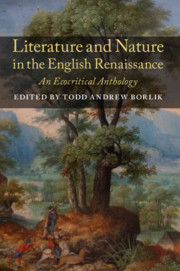Book contents
- Frontmatter
- Contents
- List of Illustrations
- Acknowledgements
- Editorial Principles: Towards the Ecocritical Editing of Renaissance Texts
- Introduction
- PART I Cosmologies
- PART II The Tangled Chain
- PART III Time and Place
- PART IV Interactions
- PART V Environmental Problems in Early Modern England
- PART VI Disaster and Resilience in the Little Ice Age
- Extreme Weather, Disorder, Dearth
- Decay
- Resilience
- Appendix A Industrialization and Environmental Legislation in the Early Anthropocene: A Timeline
- Appendix B Further Reading: A Bibliography of Environmental Scholarship on the English Renaissance
Resilience
from PART VI - Disaster and Resilience in the Little Ice Age
Published online by Cambridge University Press: 05 June 2019
- Frontmatter
- Contents
- List of Illustrations
- Acknowledgements
- Editorial Principles: Towards the Ecocritical Editing of Renaissance Texts
- Introduction
- PART I Cosmologies
- PART II The Tangled Chain
- PART III Time and Place
- PART IV Interactions
- PART V Environmental Problems in Early Modern England
- PART VI Disaster and Resilience in the Little Ice Age
- Extreme Weather, Disorder, Dearth
- Decay
- Resilience
- Appendix A Industrialization and Environmental Legislation in the Early Anthropocene: A Timeline
- Appendix B Further Reading: A Bibliography of Environmental Scholarship on the English Renaissance
Summary
The following sonnet demonstrates the Renaissance's conception of itself as an age of resilience. It was originally composed by a French poet during a sojourn in Rome, anthologized in a collection of visionary poetry by a Dutch Protestant writer, and then translated into English by a seventeen-year-old Edmund Spenser. The poem can be read as an example of translatio studii (the transfer of culture from Troy to Rome to France to England), or an allegory for the Reformation. The correspondence between Roman ruins and the decrepit tree is even more explicit in another Du Bellay poem that Spenser translated (“He that hath seen a great Oak dry and dead”), placing great emphasis on the oak's decay. Although these verses influenced Spenser's “February” (see Part ii, p. 177), the sonnet below ends on a more hopeful note with an image of coppicing – cutting trees down to the stump and allowing them to regenerate – an important strategy for preserving England's woodlands in response to the Elizabethan timber crisis.
Source: A Theatre for Worldlings, trans. Edmund Spenser (1569), C3v.
Then I beheld the fair Dodonian ° tree,
Upon seven hills ° throw forth his gladsome shade,
And Conquerors bedecked with his leaves
Along the banks of the Italian stream. °
There many ancient Trophies ° were erect,
Many a spoil and many goodly signs,
To show the greatness of the stately race,
That erst descended from the Trojan blood.
R avished I was to see so rare a thing,
When barbarous villains in disordered heap,
Outraged the honour of these noble boughs.
I heard the trunk to groan under the wedge.
And since I saw the root in high disdain
Send forth again a twin of forked trees.
GEORGE WITHER
“A Posteritati:° He that delights to Plant and Set, Makes After-Ages in his Debt” (c. 1620)
A 1611 Dutch emblem book by Gabriel Rollenhagen includes a memorable image of a man planting a tree. In the original, the emblem is accompanied by Latin glosses, encouraging readers to have children who will bless the names of their progenitors and worship God. The version below is not a translation but a radical rewriting of its moral.
- Type
- Chapter
- Information
- Literature and Nature in the English RenaissanceAn Ecocritical Anthology, pp. 554 - 563Publisher: Cambridge University PressPrint publication year: 2019



